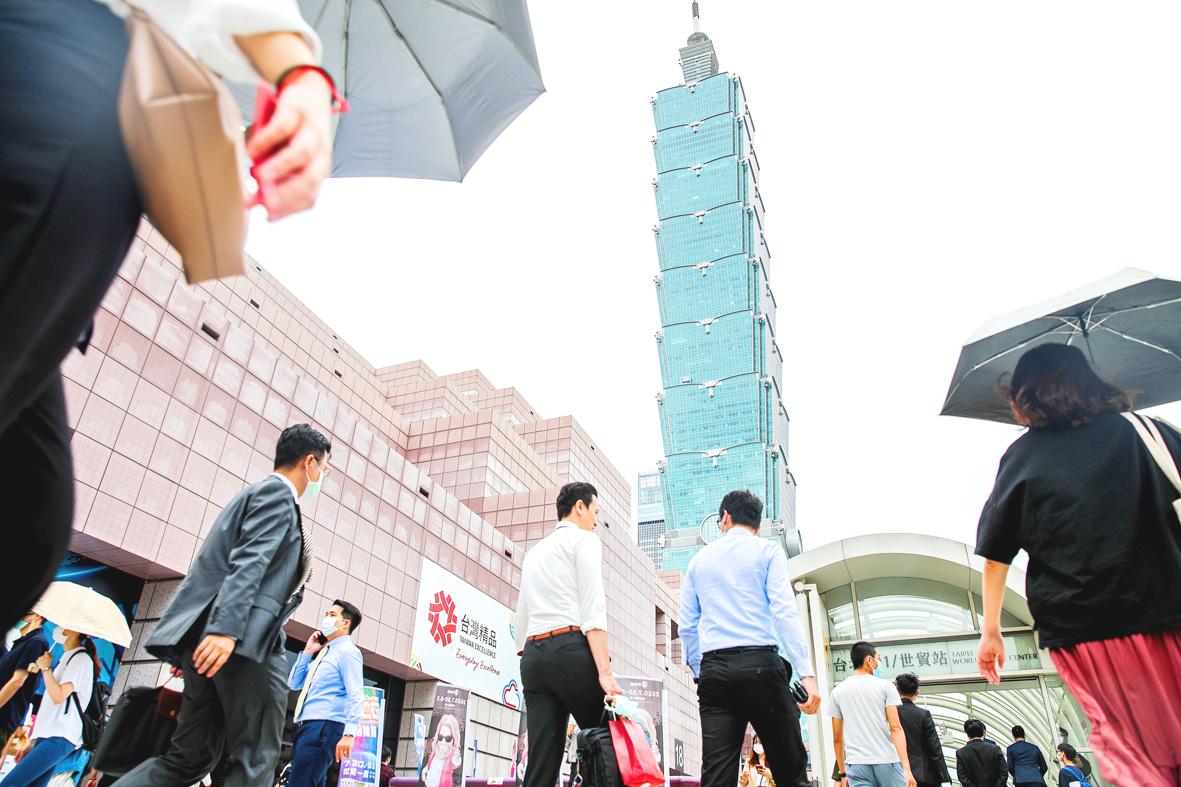The Taipei 101 shopping mall last month saw its business return to positive territory, thanks to a sharp increase in the number of domestic shoppers as well as the government-issued Triple Stimulus Vouchers.
Revenue picked up mildly last month, reversing months of decline, after Taiwanese regained confidence about shopping, the mall said on Tuesday.
Foreign tourists accounted for 30 percent of the mall’s revenue as COVID-19-related border controls wreaked havoc on its operations, it said.

Photo: Bloomberg / I-Hwa Cheng
The mall is one of the three main revenue sources for Taipei Financial Center Corp (台北金融大樓, TFCC), the operator of Taipei 101, together with admission fees to the observatory and the observation deck, as well as rental income from its office spaces.
Apart from recovered confidence, a jewel exhibition and the vouchers helped motivate shoppers, the mall said.
The World Masterpiece show last month helped boost expensive jewel and watch sales 40 percent from the same period last year, with one particular brand reporting more than twofold revenue growth, the mall said.
The shopping momentum might sustain this month, as affluent Taiwanese who are used to spending their summer vacation abroad would spend their time in the nation, it said.
Taiwan Ratings (中華信評), the local arm of S&P Global Ratings and a Taipei 101 tenant, had earlier downgraded its credit outlook for TFCC from “stable” to “negative,” citing concerns over a slump in tourists and shoppers.
Retail sales at the mall are forecast to drop by 31 to 35 percent this year as luxury and fashion consumption is discretionary and therefore vulnerable to economic shocks, it said.
The lack of foreign tourists would also curb observatory revenue, but rental income remains resilient amid stable leasing demand and rental rates, it added.
Separately, the Ministry of Economic Affairs said that 20.54 million people, or about 85 percent of the 24 million Taiwanese and foreign spouses eligible to receive the vouchers, had claimed their vouchers as of Tuesday.
Local businesses had redeemed NT$1.34 billion of stimulus vouchers for cash from banks as of Monday, the ministry said in a Facebook post.
Additional reporting by Angelica Oung

Taiwan Semiconductor Manufacturing Co (TSMC, 台積電) last week recorded an increase in the number of shareholders to the highest in almost eight months, despite its share price falling 3.38 percent from the previous week, Taiwan Stock Exchange data released on Saturday showed. As of Friday, TSMC had 1.88 million shareholders, the most since the week of April 25 and an increase of 31,870 from the previous week, the data showed. The number of shareholders jumped despite a drop of NT$50 (US$1.59), or 3.38 percent, in TSMC’s share price from a week earlier to NT$1,430, as investors took profits from their earlier gains

In a high-security Shenzhen laboratory, Chinese scientists have built what Washington has spent years trying to prevent: a prototype of a machine capable of producing the cutting-edge semiconductor chips that power artificial intelligence (AI), smartphones and weapons central to Western military dominance, Reuters has learned. Completed early this year and undergoing testing, the prototype fills nearly an entire factory floor. It was built by a team of former engineers from Dutch semiconductor giant ASML who reverse-engineered the company’s extreme ultraviolet lithography (EUV) machines, according to two people with knowledge of the project. EUV machines sit at the heart of a technological Cold

AI TALENT: No financial details were released about the deal, in which top Groq executives, including its CEO, would join Nvidia to help advance the technology Nvidia Corp has agreed to a licensing deal with artificial intelligence (AI) start-up Groq, furthering its investments in companies connected to the AI boom and gaining the right to add a new type of technology to its products. The world’s largest publicly traded company has paid for the right to use Groq’s technology and is to integrate its chip design into future products. Some of the start-up’s executives are leaving to join Nvidia to help with that effort, the companies said. Groq would continue as an independent company with a new chief executive, it said on Wednesday in a post on its Web

CHINA RIVAL: The chips are positioned to compete with Nvidia’s Hopper and Blackwell products and would enable clusters connecting more than 100,000 chips Moore Threads Technology Co (摩爾線程) introduced a new generation of chips aimed at reducing artificial intelligence (AI) developers’ dependence on Nvidia Corp’s hardware, just weeks after pulling off one of the most successful Chinese initial public offerings (IPOs) in years. “These products will significantly enhance world-class computing speed and capabilities that all developers aspire to,” Moore Threads CEO Zhang Jianzhong (張建中), a former Nvidia executive, said on Saturday at a company event in Beijing. “We hope they can meet the needs of more developers in China so that you no longer need to wait for advanced foreign products.” Chinese chipmakers are in